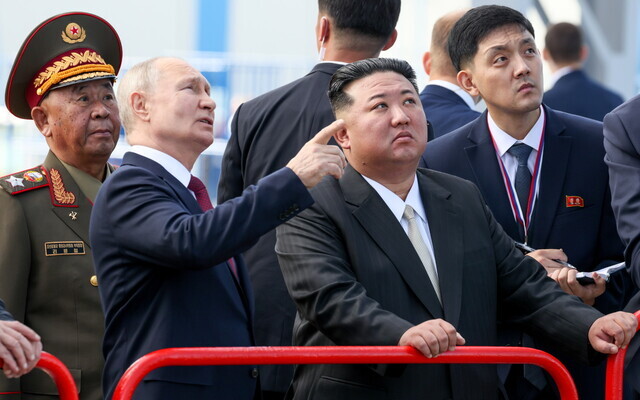
Russian President Vladimir Putin and North Korean leader Kim Jong-un speak as they tour the Vostochny Cosmodrome in Russia’s Far East on Sept. 13. (Yonhap)
The summit between North Korean leader Kim Jong-un and Russian President Vladimir Putin on Wednesday at a remote space launch center in Russia appears likely to go down as a watershed ushering the “new Cold War” framework in Northeast Asia to a new plateau.
Kim’s extended visit to Russia — his first in four years and five months — has had the effect of reorganizing the Northeast Asia order into one pitting a quasi-military alliance between South Korea, the US and Japan against close-knit military cooperation between North Korea and Russia. It is a case where the side effects of trilateral cooperation by Seoul, Washington, and Tokyo have made themselves felt.
In their first meeting since April 2019, the leaders repeatedly emphasized the strong bonds between their two sides.
In remarks delivered before the summit, Putin said, “Let me remind you that it was our country that was the first to recognize the sovereign independent state – the Democratic People’s Republic of Korea.”
In response, Kim said it was the firm position of the North’s government that “relations with the Russian Federation are the top priority for our country.”
In particular, Kim voiced active support for Russia in the conflict it initiated with Ukraine.
“Russia is currently engaged in a sacred battle to defend its state sovereignty and security in the face of the hegemonic forces that oppose Russia. We are willing to continue to develop our relations. We have always supported and will continue to support every decision made by President Putin, as well as the decisions of the Russian government,” he said, adding that he hopes North Korea and Russia “will always stand together in fighting imperialism and building a sovereign state.
He also said he was “confident that the Russian army and people will inevitably attain victory in the sacred struggle to punish the evil crowd, which claims the right to hegemony based on the illusion of expansionism, a struggle to create the stability needed for development.”
His message read as signaling that North Korea would actively supply the shells that Russia is hoping for. If this assistance is provided, it could become a factor dragging the Russo-Ukrainian war out further.
During the summit, the two leaders agreed on the need for North Korea and Russia — both of which face sanctions from the US — to cooperate on overcoming the pressure against them. In particular Putin expressed his intent to help with North Korea’s satellite development.
This means the two sides have moved straight into a stage of cooperation on military technology, while disregarding the concerns of the international community. As South Korea, the US and Japan move rapidly toward a quasi-alliance framework, North Korea and Russia have beefed up their previously weak relationship and responded immediately with the possibility of military cooperation.
This closeness between Pyongyang and Moscow is very likely to provoke Seoul, Washington and Tokyo in a way that sharply raises tensions surrounding the Korean Peninsula.
The weapon technology transactions between North Korea and Russia could propel the former’s nuclear and missile capabilities leaps and bounds in a very short time.
If the North succeeds with its planned reconnaissance satellite launch attempt in October — after failed ones in May and August — Northeast Asia is likely to be plunged once again into turmoil. The likelihood of the Korean Peninsula and its neighbors getting drawn into the vicious cycle of an arms race is severe.
The coziness between Pyongyang and Moscow could also cause problems for the administration in Seoul in its strategy using policies of extreme pressure to resolve the North Korean nuclear issue.
“We have to view this as the beginning of North Korea’s diplomatic response to the stronger security cooperation between South Korea, the US and Japan,” commented Jeh Sang-hoon, a professor of Russian studies at the Hankuk University of Foreign Studies.
China had yet to show much of a response to the North Korea-Russia summit. In remarks on Wednesday, Chinese Foreign Ministry spokesperson Mao Ning spoke only in generalities, saying only that “the DPRK leader’s visit to Russia is something between their two countries.”
But foreign news outlets predicted a possible summit between Putin and Chinese President Xi Jinping at the Belt and Road Forum for International Cooperation in China this October.
Meeting with reporters in Vladivostok, Russian Foreign Ministry spokesperson Maria Zakharova said Foreign Minister Sergey Lavrov would be meeting in Moscow on Sept. 18 with Wang Yi, a member of the Chinese Communist Party’s Politburo and top diplomat.
By Shin Hyeong-cheol, staff reporter
Please direct questions or comments to [
english@hani.co.kr]




